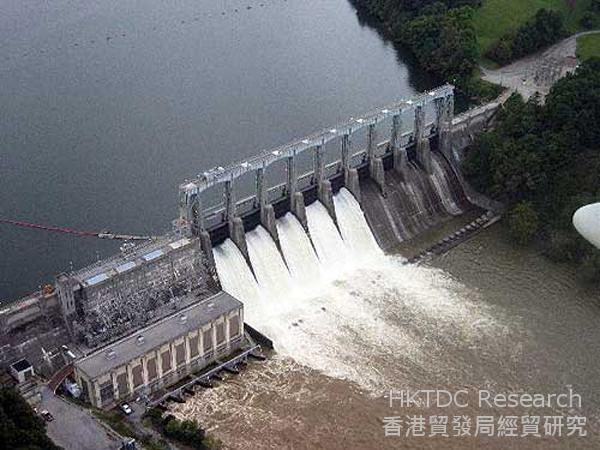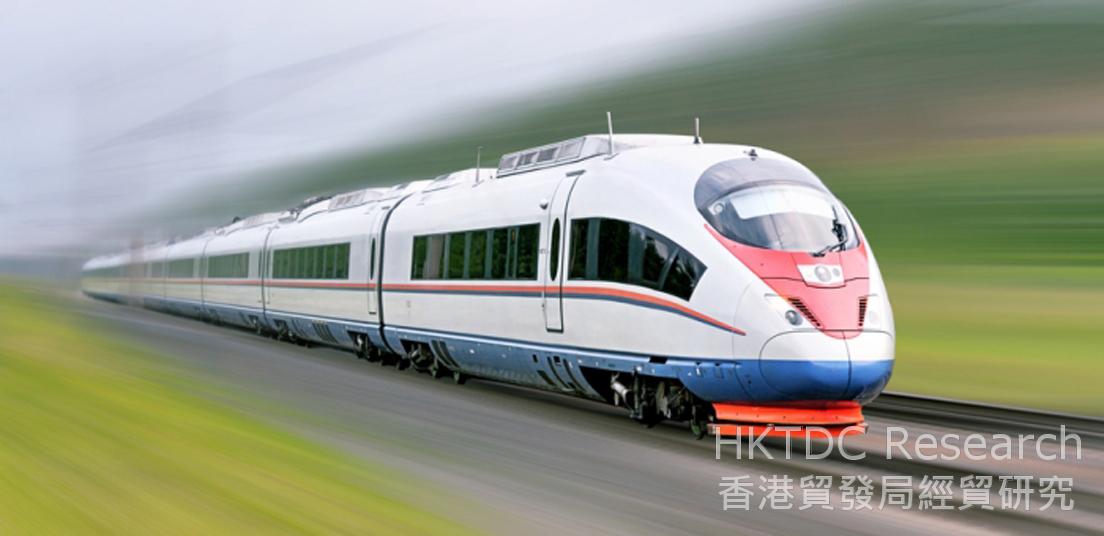更多文章



By Lan Shen
SUMMARY
China’s Belt and Road (B&R) initiative – the ambitious project to build infrastructure and expand trading relationships along a new Silk road – has made significant headway in the past four years, and is now well into the implementation stage. So far, 20 per cent of investment in B&R has been in power and 19 per cent in railways, followed by roads, pipelines and other transport. With China’s government prioritising B&R as a key initiative to help open up its economy, there are five trends that show B&R is taking off in a big way.
Please click here to read the full article.
更多文章
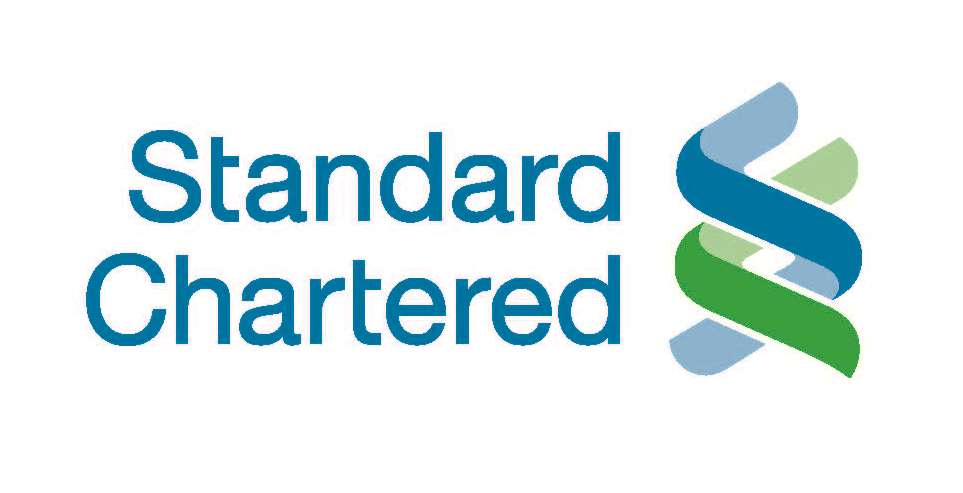





隨著地區和全球競爭持續加劇,香港信託行業的未來前景既有美好的一面,同時也充滿挑戰。本報告的主要目的是勾畫最新的香港行業趨勢,並就如何提升市場競爭力發表深入見解。這包括建議擴大業界規模及服務範圍,以鞏固香港長遠作為信託司法管轄權的地位。
在本報告中,我們分析了香港應該處理的一些主要挑戰和領域:
1) 合規難題
信託公司正在投放更多的時間和精力來處理合規和監管事宜,導致營運成本上升。成本上漲往往會削弱盈利能力,或是轉嫁予客戶,而這兩方面均不利於信託業的發展。部分公司正在轉用以科技作為基礎的解決方案,而其他公司則正在促請政府簡化全球的合規政策。
2) 提升人才儲備
受訪者普遍表示業界缺乏各方面的人才,例如信託管理、法律和合規以及客戶管理等。信託業的專業人員普遍被指缺乏正規培訓和資歷,但香港信託人公會正與香港證券及投資學會合作提供解決方案。
3) 簡化監管框架
香港信託業多元發展,意味著監管制度高度分散。雖然管治範圍得到界定,但報告、發牌和審批過程卻出現重疊監管的情況。對信託公司進行監管被業界視為是推動行業發展的最有效方法,而部分受訪者則促請採用單一監管模式,可以簡化披露和提高效率。
4) 明晰稅法
許多從業者認為目前適用於信託業的稅法,特別是針對在香港進行貿易或商業活動的信託,存在含糊不清的地方。因此,業界期望可提高稅法的清晰度和確定性,以加強香港作為信託管轄區的競爭能力。香港應考慮就信託稅務制定一套全面的稅法,情況與新加坡和英國等其他可資比較的司法管轄區相近。
各信託板塊還有很多可改善之處,例如進一步改進強積金系統(包括開發eMPF中央電子平臺、提供更多退休收入流的產品、與提高供款率)、引入目的信託法例,以及成立慈善信託委員會。
為了鞏固香港強大的基礎,並利用其作為金融服務中心的優越位置,政府、監管機構和信託業將需要加強合作。
面對新加坡,以及海峽群島、英屬維爾京群島及開曼群島等傳統司法管轄區的激烈競爭下,各持份者之間必須加強合作,才可將香港定位為信託服務的首選地。
如欲瀏覽全文,請下載PDF 檔。
編輯推薦
熱門文章

A straw poll of work colleagues will quickly confirm that few know the geographical location of Djibouti despite it being a strategically key port on the busiest shipping route in the world. The Belt and Road Initiative will have a transformational effect on a place known as the Crossroads Nation.
The highly distinctive and recognisable Aedas strategic master plan for Djibouti will reinvigorate the city and encourage the growth in trade of capital, goods and services through the whole of East Africa.
The strategic military bases within the city make it very secure. Its political stability is an additional asset. Its people incredibly polite and always smiling and the potential for growth is huge. Already its telecommunications system ranks among the best in Africa.
The strategic master plan is a progressive and sustainable model for regeneration that not only looks to the future but also draws from the rich heritage and culture of the city and the country. The astonishing cultural diversity of Djibouti, apparent in its historic French Colonial Quarter and Arabic houses, informs the urban grain and scale of the masterplan and ties the new into the historic fabric.
There is a danger with a master plan proposal of this scale is that the historic context and diversity is lost amongst the delivery of a skyline of high-rise towers and reflective glass. It is better to create a master plan that has been informed by the special nature of the place and so works with it.
The development is on the key peninsula site of Djibouti and will deliver not only a new and vibrant waterfront, but create a series of distinct places within a sustainable environment, offering leisure and tourist facilities, commercial office space, cultural and residential quarters and a focus for new foreign investment to the city and so the wider country. The master plan focus is not about buildings alone but is equally about space and places for the population to gather and connect. It has a new cultural heart which creates a public venue and focus for a new chapter in Djibouti’s history.
The recently completed railway connections and the planned airport upgrades will sit alongside the new port and cruise terminals ensuring that a full range of transport infrastructure facilities will be in place to deliver the sustained economic regeneration of the wider Aedas master plan. The huge benefits of the industrial parks and modern farms will ensure goods and services are able to be presented, traded and moved out from Djibouti, by various routes.
Catering for local and international investors and manufacturers, the master plan recognises culture and national identity as key to the success of the new opportunity, with revitalisation an ongoing process, which involves public participation as well as private investment. In addition the key principles of public space and landscape themes are in evidence throughout the masterplanning guidelines and will create the distinctive places Aedas has set out to deliver.
更多文章
「一帶一路」倡議開啟藝術文化的一扇新窗口,特別是對西九文化區的表演藝術發展。文化區管理局表演藝術行政總監茹國烈指出,西九的場地於2018到19年相繼落成,新設施能提供更多的演出機會,讓「一帶一路」國家的藝術家作深入交流。M+行政總監華安雅視新建築群為文化藝術載體,推動視覺藝術發展。行政總裁栢志高則認為西九讓不同的藝術形式相互碰撞,為「一帶一路」沿線國家以至全球,帶來更具創意的原創作品。
講者:
西九文化區管理局行政總裁栢志高
西九文化區管理局表演藝術行政總監茹國烈
西九文化區管理局M+行政總監華安雅
相關連結:
香港貿易發展局
http://www.hktdc.com
香港貿發局「一帶一路」資訊網站
http://beltandroad.hktdc.com/tc/



香港城市大學新絲路研究中心
(一)一帶一路“設施聯通”建設中,PPP模式的優勢
“一帶一路”倡議主要由兩個部分組成,“絲綢之路經濟帶”和“21世紀海上絲綢之路”。 倡議將以沿線國中心城市為支撐,以重點合作經貿園區為平臺,完善基礎設施建設,推動國家間貿易和投資,以實現區域的共榮共贏。[1] 2017年5月,在北京召開了一帶一路峰會,此次峰會中更加明確了一帶一路倡議實施的五個主要方向和著力點(簡稱:“五通”):政策溝通、設施聯通、貿易暢通、資金融通、民心相通。 其中,大量在建和即將建設的基礎設施工程,將成為一帶一路戰略“設施聯通”的最重要組成部分。
這些工程對於一帶一路戰略的實施和推進,對於實現“設施聯通”的意義和價值不言而喻。這些工程的盈利能力,長週期,高投入的特點,以及沿線國的政治經濟風險等問題,不僅是西方國家和許多學者專家由此對一帶一路倡議背後動機質疑的理由, 也是長久以來,基礎設施建設投資所不可回避的挑戰。面對種種質疑和挑戰,是PPP模式(Public-Private-Partnership, 即政府-社會資本-合作模式),因其有風險分擔和多樣化融資的特徵,將會必然扮演重要角色。全世界範圍內,PPP模式應用的案例非常多,發展歷史也比較悠久。
PPP模式對一帶一路沿線的基建項目建設將會有以下幾個方面的優勢:
- 沿線國基礎設施建設需求龐大,但相應的技術和資金匱乏,PPP模式是化解這一困難的有效手段。 根據世界銀行的數據測算,2015年“一帶一路”沿線國家(包括中國)的GDP約為24.86萬億美元,占到全球經濟總量的1/3左右。假設以總體基建投入約占GDP的5%進行估算,那麼“一帶一路”沿線對基建的需求或達到每年24萬億美元。 現有的資金來源主要包括:沿線國家內部的金融資源和國際金融機構。據元立方金服研究對“一帶一路”資金來源的考察,絲路基金、亞洲基礎設施投資銀行、金磚國家開發銀行以及上合組織開發銀行這4個官方融資渠道能向“一帶一路”建設提供的融資規模大概在3500億美元左右。一帶一路基礎建設方的融資需求無法得到有效滿足臨著巨大的融資需求。更重要的是,在基礎建設領域投資,除資金外,投資的組織和運用形式也至關重要。PPP模式強調轉化政府職能,利用企業運營經驗,提升政府的服務效能。 因此,PPP模式即可以幫助沿線國家吸引外國投資者在本國長期發展,解決基礎建設融資的問題,又為沿線國家的政府提供了向外國優秀企業學習的機會,積累管理和運營的經驗。
- 部分一帶一路國家有 PPP 合作經驗。 PPP 是歐洲特別是英國最早採用的融資建設及運營基礎設施的方式。不少當地政府具有與這些國家交往和合作的經驗,因此,在法律上和政策上相對容易適應和操作。基礎設施 PPP項目往往需要政府在政策法律土地稅收等各方面給予支持,因此,提前對開發,建設和運營中與行政職能交叉重疊部分進行合理安排和分工,可以有效降低企業的融資,建設和運營成本,從而實現以最小的成本實現公共服務效能的最大化。
- PPP投資模式,可以滿足企業以股權的投資形式進行投資,擺脫單純地承包商的角色,更好地參與項目的決策過程中。“一帶一路”將會有很多相對綜合的發展項目,而不僅僅是工程建設,比如鐵路或者港口的建設和運營,甚至園區整體開發。PPP 模式的核心,即是由承辦資本方通過良好的經營向政府提供其需要購買的服務,這正是這種綜合發展項目最需要的。
(二)中國企業和中國PPP模式的機遇
首先,根據AEI (China Global Investment Tracker)[2]和世界銀行的統計,截至2016年,中國在一帶一路沿線國家直接投資和建造合同總額為780.8億美元,占全球範圍內投資31.8%。 其中,建造合同方面,2016年我國對一帶一路國家建造合同額為474.9億美元,占全球範圍內投資的62.11%。 [3]據商務部最新數據,中國企業目前已經在“一帶一路”沿線20個國家建設了56個經貿合作區,涉及多個領域,累計投資超過185億美元。現階段,中國作為倡議國,在對一帶一路國家的投資和建設中,承擔了很好的帶頭作用。
與此同時,我們看到,由於中國自身發展的需要,自2014年初PPP模式推廣以來,截至2017月初,按照要求審核納入PPP綜合信息平臺項目庫的項12699個,總投資額153,011億元。[4] 儘管中國PPP模式發展時間並不長,自身存在的問題也有很多,但是中國PPP項目體量大,且覆蓋各個領域,應用於不同行業和區域。在這個過程中金融機構,企業,政府,包括諮詢服務和學術研究機構都積累了大量的經驗和教訓。 這些經驗和教訓不僅僅使得中國的企業,政府和各類相關機構對PPP模式的機制和應用有了更成熟和深刻的認識,也將為一帶一路沿線國家應用PPP模式提供豐富的實踐經驗。例如,香港特別行政區為了更好地指導 PPP 項目在香港的實行,效率促進組(Efficiency Units)先後出臺了《公私合營項目 PPP 指南》和《公私合營項目 PPP 指南 2008》。 香港也有相當一批優秀的企業,成功的運用PPP模式,實現了提高公共服務效能的同時,為企業創造利潤。其中,香港港鐵公司的“軌道+物業”模式獲得了大量關注,許多國家的軌道交通規劃建設上,都予以借鑒和學習。這些豐富的經驗和資源,成功案例和失敗教訓,將對就一帶一路沿線國的投資建設起到指導和借鑒的作用,也將成為中國向世界分享和推廣自身PPP模式的機會。
(三)一帶一路上的PPP典型案例
In May 2017, the National Development and Reform Commission to the whole society to collect all the way to a typical case of PPP, these projects under construction and the construction of the project to a certain extent reflects the use of infrastructure infrastructure investment in the use of PPP mode, also provides PPP Mode in the area along the country with the application of the real case. The solicitation event, eventually 52 items shortlisted. Shortlisted 52 projects, almost all by large state-owned enterprises swept. The top three areas of the project are: electricity; park development and communication, information, network; of which the power project accounts for nearly 40% of the total number of projects. BOT, DBFOT, BOOT, BOO, participation in shares and other forms exist in the PPP mode, in which the BOT is most widely used. The investment in the shortlisted project covers 26 countries and regions around the world, however, Southeast Asia topped the list, accounting for four percent. Twenty-one of the 52 projects gave a clear franchise period. Some projects are funded by the National Development Bank, including AIIB, Silk Road Fund and other international financial organizations with the same direction as the core, but mainly self-financing. From the payment method, the government to buy the main, followed by the user to pay the way.
PPP model as one of the basic options for infrastructure construction, shortlisted projects, energy and large municipal projects accounted for 85% of the total number of projects. At the same time, because of such large-scale projects on the enterprise's capital, technology and scale requirements are relatively high, the strength of the central enterprises, state-owned enterprises to become the main force. For example, the national grid, in the power grid infrastructure has a wealth of experience, the finalists selected projects include: Pakistan Minti Li - Lahore HVDC project, the Brazilian holding company equity and green investment projects, the Portuguese National Energy Network (REN) equity investment projects and Greek independent transmission operations company equity investment projects. Shortlisted part of the project, Chinese enterprises get more than 50% stake, accounting for absolute holding position. (Such as: Indonesia Bali 3 × 142MW coal-fired power plant project; Vietnam Haiyang 2 × 600MW coal-fired power plant). It can be said that Chinese enterprises in these PPP projects, to master a certain degree of dominance and influence for the PPP model in these countries have a certain influence. On the other hand, shortlisted projects, the choice of PPP mode to BOT-based, financing channels and return patterns are relatively simple. PPP mode in the area along the way part of the country's application is still the primary stage. How to give full play to the advantages of PPP mode, to support the way along the way infrastructure construction, there is a lot of development and exploration of space.
Finally, although the application of PPP mode, will face many problems and challenges. For example, how does the PPP model adapt to the economic and political soils of the countries along the country, how to ensure the value of money for the PPP project, how to improve the government's effectiveness, and how to set up a PPP model The best practice, design a more scientific performance evaluation system ... ... are placed in front of the real problem, it is worth our further thinking and research. But no means that the implementation of a strategy along the way, especially the realization of facilities Unicom, PPP model will play an important role. June 17, 2017, the National Development and Reform Commission Deputy Director of Finance Chen Hongwan also "Infrastructure Investment and Financing International Symposium" said that with the "one way along the" advance, the next five-year plan " PPP investment may be more than 20 trillion yuan. [5] Chinese enterprises should grasp the opportunity along the way, combined with their own development experience, give full play to and use the advantages of PPP model for the "one way" and the construction of local people to enhance the quality of life to contribute.
[1] Xinhua News Agency, authorized release: to promote the construction of the Silk Road economic zone and the 21st century Maritime Silk Road vision and line http://news.xinhuanet.com/finance/2015-03/28/c_1114793986.htm
[2] China Global Investment Tracker, http://www.aei.org/china-global-investment-tracker/
[3] China along the way network, the Ministry of Commerce data: https://www.yidaiyilu.gov.cn/info/iIndex.jsp?cat_id=10018
[4] Ministry of Finance, Government and Social Capital Research Center, http://www.cpppc.org/
[5] China along the way network, Development and Reform Commission: the future area of PPP investment or over 20 trillion http://www.sohu.com/a/149939192_731021
編輯推薦
熱門文章
「一帶一路」倡議需要沿線國家在政策上配合,拆牆鬆綁,促進投資及商貿合作。於9月11日舉行的第二「一帶一路高峰論壇」屆就以「化願景為行動」為主題,聚焦基建與東盟所帶來的投資機遇。

逾3,000名政商界精英參與
由香港特別行政區政府以及香港貿易發展局合辦的第二屆"一帶一路高峰論壇",請來了40位"一帶一路"沿線國家和地區的政府高層及商界翹楚,就著"一帶一路"倡議的最新發展,以及為不同界別帶來的機遇深入討論外,更設有投資項目介紹、一對一項目對接,以及各類專業服務展區介紹,集智庫和實質合作于一身,高峰論壇共吸引約50個國家及地區,超過3,000名來自政商界的精英參與。
國家發展和改革委員會副主任甯吉喆於論壇開幕環節的主題演說中表示,國家發改委將繼續支持香港發展經濟,在推進"一帶一路"和粵港澳大灣區建設,以及人民幣國際化等重大發展策略中,發揮優勢,使香港在服務國家的同時,實現自身更好的發展。商務部副部長高燕表示,香港可以跟內地聯手,打造投、融資平臺、交通和物流樞紐,以及專業服務平臺,並借助粵港澳大灣區發展,令香港成為"一帶一路"的重要支點。外交部駐港特派員公署特派員謝鋒表示,香港能夠在"一帶一路"中,發揮促成者和推動者的獨特作用。
香港貿發局主席羅康瑞表示︰"今屆論壇以‘化願景為行動’為題,旨在結合項目計劃、投資者以及具專業知識的專才,變成商業化、具經濟效益及可投資的發展項目。"他又表示,香港貿發局將聯繫世界各地對"一帶一路"倡議有興趣的組織,組成聯盟,致力推廣倡議的商機。

(左圖)國家發展和改革委員會副主任甯吉喆表示,國家發改委將繼續支持香港發展經濟。(右圖)商務部副部長高燕表示,香港可以跟內地聯手,打造投、融資平臺、交通和物流樞紐,以及專業服務平臺,令香港成為"一帶一路"的重要支點。

(左圖)香港特區行政長官林鄭月娥致辭時表示,現屆特區政府跟中央政府商討新的合作協議,支持香港在"一帶一路"的發展。(右圖)香港貿發局主席羅康瑞表示,該局將聯繫世界各地對"一帶一路"倡議有興趣的組織,組成聯盟,致力推廣倡議的商機。
促成實質交易與合作 聚焦東盟基建發展
論壇更是"一帶一路"沿線企業洽商合作的平臺,例如泰國上市的綜合企業Loxley,繼五月時接待貿發局訪問泰國的代表團後,該企業於論壇期間跟香港科技企業視野機器人有限公司簽署合作備忘錄,嘗試把香港的高新科技帶到泰國,從而配合"泰國4.0"的發展計劃,希望以科技提升泰國的經濟地位。而貿發局也為Loxley的代表,提供項目簡介及配對的機會。
首場討論環節以"投資‘一帶一路’︰與政策官員對話"為題,由香港金融發展局主席史美倫擔任主持,並與香港特區政府商務及經濟發展局局長邱騰華、泰國外交部副部長Virasakdi Futrakul,以及波蘭基礎設施與建設部副部長Justyna Skrzydło,進行政策解碼,透視各國政策走向,為投資做好準備。
另一場討論環節則針對近年經濟起飛的東盟市場,討論區內基建發展需求和相關機遇,並由亞洲金融集團總裁陳智思擔任主持,請來了六位來自香港、中國內地以及東盟國家,在基建項目有實戰經驗的嘉賓,以項目投資者、服務供應商以及用家的角度,解構基建項目如何配合東盟發展需要,香港企業如何參與其中。
論壇專題午宴則由香港特區財政司司長陳茂波致歡迎辭,請來了亞洲基礎設施投資銀行副行長兼首席行政官吳洛基博士擔任主題演講嘉賓。據瞭解,亞投行目前已為其80個成員國提供新平臺,支援不同基建項目。吳洛基博士同時也解讀了亞洲區內基建發展藍圖,以及該行的投資策略。
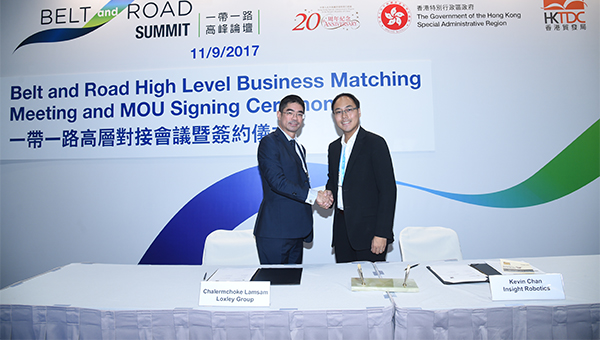
泰國上市綜合企業Loxley,於論壇期間與香港科技企業視野機器人有限公司簽署合作備忘錄,嘗試把香港的高新科技帶到泰國,配合"泰國4.0"的發展策略。
鼓勵創業者與年輕企業家參與
下午的專題分組論壇,探討了香港的金融及法律專業如何配合"一帶一路"沿線國家的基建發展。主辦方與金管局基建融資促進辦公室(IFFO)合辦的一場專題分組論壇,由IFFO顧問馮國經博士主持,請來了不同主要持份者,探討香港金融界如何在項目的財務安排上,協助投資者及項目擁有者,為項目創造最大效益。另一場專題分組論壇則由主辦方與香港特區政府律政司合辦,請來了傑出的仲裁員和法律界人士,講解香港的法律專才如何在基建項目中,由風險評估至制定合同時減少爭拗、管理潛在法律風險,及有效解決爭議。另一場分組論壇就以"青年企業家分享‘一帶一路’機遇"為題,請來香港及東盟國家的青年商界領袖,分享他們眼中的"一帶一路"商機,鼓勵更多創業者及年輕企業家參與"一帶一路"發展。
多個來自"一帶一路"沿線國家及地區的項目擁有者,帶來超過150個不同範疇的投資項目、物色投資者以及相關的服務供應商。主辦方按照項目性質,設有三個不同主題的投資項目介紹及交流會。在"運輸及物流基建"環節,參與的包括中國對外承包工程商會、泰國高速公路管理局、阿布劄比哈裡發工業區等。"能源、天然資源及公用事業"環節,介紹項目的包括俄羅斯Engineering Consulting Company主席、哈薩克國家財富基金的代表等。而"城市發展"環節,參與的則包括印尼棉蘭市加速海事發展理事會、緬甸城市和住房發展部和越南Sunny World Property Development等。主辦方同時為項目擁有者、投資者及服務提供者,安排一對一項目對接會,活動成功吸引超過200家企業參與。

亞洲基礎設施投資銀行副行長兼首席行政官吳洛基博士表示,亞投行目前已為其80個成員國提供新平臺,支援不同基建項目。
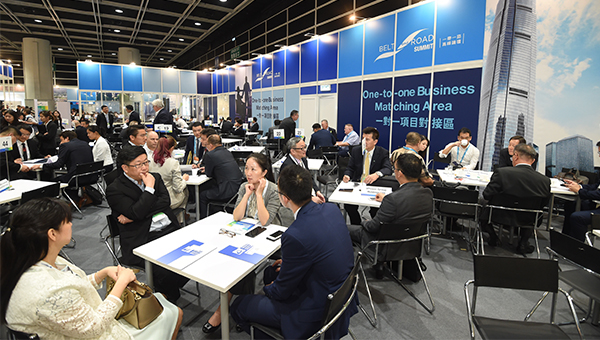
各國參會代表帶來超過150個投資項目,部分於投資項目介紹及交流會中作簡介。
提供金融、法律、科技等服務諮詢
為了讓來自各地的商界人士,認識香港服務商的優勢,論壇現場設有展覽區。超過30家銀行、金融服務、基礎建設及專業服務供應商,為與會人士提供融資、顧問服務、法律、會計以及資訊科技服務的諮詢。還有全球投資機遇專區,提供印尼、馬來西亞、緬甸、新加坡、泰國、菲律賓、越南及德國的最新市場資訊和投資機遇。
今屆"一帶一路高峰論壇"為香港回歸20周年的慶祝活動之一,獲得各界支持,體現了慶祝活動的主題"同心創前路,掌握新機遇"。論壇請來40位來自世界各地的商界領袖作為論壇名譽顧問,並由中國國際金融股份有限公司作合作夥伴及中國銀行(香港)有限公司為鑽石贊助商。

(左圖)論壇現場設有展覽區,彙聚超過30家銀行、金融服務、基礎建設及專業服務供應商,為與會人士提供相關服務諮詢。(右圖)主辦方同時為超過200家企業安排了一對一項目對接活動。
編輯推薦
熱門文章
中國大力支持老撾發展可持續能源,為兩國在「一帶一路」倡議下更緊密的長期合作鋪路。
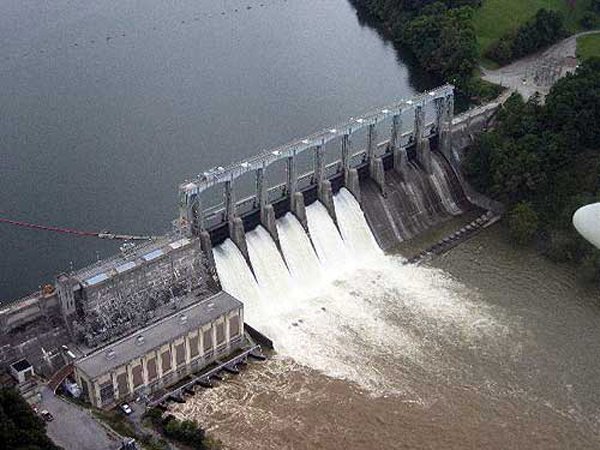
今年較早時,中國及老撾共同開展發電量達1,156兆瓦(MW)的南烏江流域梯級水力發電項目第二期工程。這項工程在老撾的主要河流南烏江進行,被視為該國在中國「一帶一路」倡議下的重點發展項目。
老撾於2016年的國內生產總值僅得159億美元。有見及此,這項工程的造價(28億美元)大部分由中國承擔,老撾則同意未來29年由中方營運水力發電設施。工程完成後,整個設施將由7個水壩及水力發電站組成,預期裝機容量達1,156兆瓦,每年能源輸出為5,017吉瓦時(GWh)。
中國水電建設集團總部設於北京,是一家國有水電工程及建造公司,也是南烏工程的中方牽頭公司。中國水電與老撾的國有電力公司Electricite Du Laos (EDL)訂立協議,同意共同出資開發南烏項目,由EDL持有項目15%權益。根據協議條款,全部發電量將售予EDL。此外,南烏項目的重要性亦在於首次有中國企業取得整條流域的規劃及發展權。
南烏項目的第一期工程包括建設南烏2號、5號及6號發電站,已於兩年多前完成,並在2015年11月29日首次發電。第一期設施的估計裝機容量合共約為540兆瓦,接近當初預計整個項目完成後總裝機容量的一半。大約5個月後,第二期工程動工儀式舉行,為餘下南烏1號、3號、4號及7號發電站的建造工程揭開序幕。第二期工程預計於2020年完成。
老撾能源及礦業部部長Khammany Inthilath博士強調項目極為重要:「南烏項目完成後,將在紓緩我國貧窮問題方面擔當重要角色。其中,項目將推動龍坡邦(Luang Prabang)及豐沙里(Phongsaly)兩省的社會及經濟發展,大大提升當地居民的生活質素。
「項目亦可在應對南烏江盤地的季節性乾旱問題上發揮重要作用。我們的最終目標是希望長期為下游耕地提供灌溉用水,並減少土壤侵蝕。」
不過,另一方面,項目也招來四方八面的批評。首先,外界關注這些大規模水力發電項目可能損害環境,尤其是湄公河及其支流一帶正發展多個大型水力發電項目,惹人關注。除了南烏項目外,中國亦參與另外多個水力發電工程,包括位於東沙洪(Don Sahong)、北賓(Pak Beng)及沙耶武里(Xayaburi)的項目。
其次,老撾的鄰國亦擔心,這些水力發電項目的不良效應日積月累,會對水流帶來影響。泰國、越南及柬埔寨政府均曾公開反對老撾擴大水力發電計劃。
第三,中國在老撾大舉投資,令後者因發展基建而債台高築,是另一為人詬病的地方。截至2016年年底,中國已在老撾注資54億美元,毫無疑問是老撾的最大境外投資者。
根據老撾政府的數字,截至2016年年底,中國公司在老撾承接的建設項目總值達67億美元,佔老撾基建升級計劃總預算開支約30.1%。這些巨額合約讓老撾成為東盟集團之中,中國的第三大承建服務輸出市場。
大興土木可謂利弊互見,不過整體而言,老撾積極參與「一帶一路」相關項目,正好符合該國的長遠目標,由一個內陸國家發展成為有陸路運輸聯繫的經濟體,擔當連接鄰國的橋樑。此外,老撾與中國一直在多個能源項目合作無間,足以印證兩國的友好關係。
在南烏項目第二期工程的發布儀式上,中國駐老撾舊都龍坡邦的總領事黎寶光談到兩國關係:「今年是中國與老撾建交55周年,現在這個合作項目再度動工,實在沒有比這更好的紀念方式了。」
特約記者 Geoff de Freitas 永珍報道
編輯推薦
熱門文章
來源:新華財金社
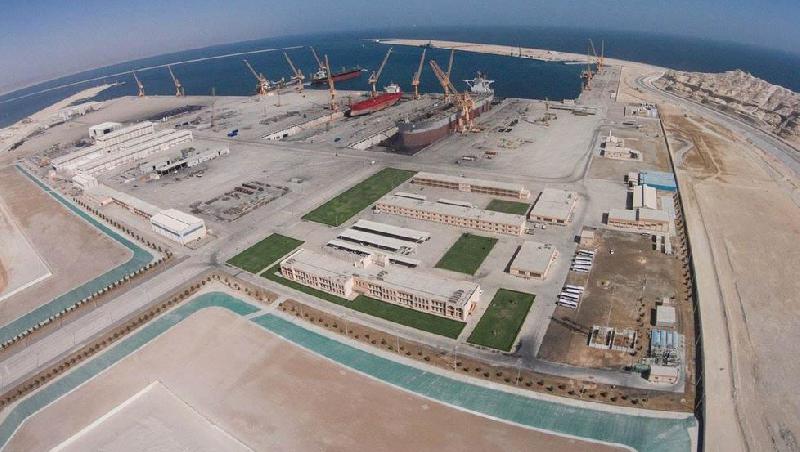
2014 年以來,中國與阿曼的合作領域不斷拓寬。在中阿博覽會框架下,寧夏與阿曼國進行反復協商洽談後,決定在位於杜庫姆經濟特區建設中國─阿曼(杜庫姆)產業園,並作為建設開放寧夏、實施"走出去"戰略的示範工程重點培育。2016 年這個產業園被中國國家發展改革委列為重點推動建設的 20 個國際產能合作示範區之一,被國家商務部列為 16 個重點國際產能合作園區之一。
調研瞭解到,阿曼杜庫姆經濟特區於2011年10月成立,是一個自由貿易區,外國投資者可在此建立100%的獨資公司;進口到特區的商品將享受免稅待遇;投資者進行註冊、取得營業許可和環境許可等證件均可享受國際上流行的方便、快捷的"一站式"服務。
該特區在基礎設施方面已累計投資140億美元,建有港口、船塢、機場、道路、電廠、水廠、酒店、公寓等,特區內有關公司註冊、員工聘用、貿易便利、土地租賃和稅費優惠等各項鼓勵投資者的政策和措施也已陸續公佈實施。
2015年4月,寧夏開始著力推動在阿曼杜庫姆經濟特區建設中國產業園的工作;2016年5月23日,寧夏與杜庫姆經濟特區政府就建設中國產業園的協議正式簽約;2017年4月19日,中國─阿曼(杜庫姆)產業園舉行奠基典禮和企業入駐簽約儀式。
中國─阿曼(杜庫姆)產業園佔地面積 11.72 平方公里,項目建設週期為10年,有望通過5年的建設初具規模,擬建項目規劃總投資700多億元人民幣,規劃的產業包括石油化工、天然氣化工、建築材料、清真產業、電子商務等9個領域。根據規劃,產業園將建設成為擁有"兩大空間佈局、三大功能平台、六類支柱產業、八項管理服務"的加工制造型經貿合作園區。
中方自阿方提出特區建設之時起,就抓住機遇積極推動合作。
2015年,雙方簽訂了中國─阿曼(杜庫姆)產業園區合作框架協議。經過共同努力,產業園在不到兩年的時間裡順利奠基啟動建設,成為目前單一國家入駐經濟特區的最大項目,體現了雙方重視實現優勢互補、共同發展的巨大潛力。
由中國國際工程諮詢公司完成的中國─阿曼杜庫姆產業園規劃中的目標是,10年左右的時間投資100多億美元,用地12000 畝,用工12000人。18台件大型施工機械已與2016年6月底運達產業園區投入使用。
目前,這個園區已有來自寧夏、遼寧、湖北等地10家企業入駐,簽約金額280多億人民幣,包括火力發電、海洋取排水及海水淡化提溴聯產、180萬噸天然氣─甲醇─烯烴、高機動越野車、五星級酒店、年產 1GWp 光伏組件、石油及天然氣管材、建材市場、鋼絲網骨架增強複合管、柔性高壓複合輸送管等項目。
中國─阿曼(杜庫姆)產業園的建設有著三重戰略價值:一是產業園位於東西方國際海運航線的交匯點,連接重要生產市場和主要消費市場,地理位置重要,具有成為全球轉運樞紐、供應中東市場商品集散中心的潛力;二是杜庫姆經濟特區在稅收、外國投資者准入、生產要素價格、員工聘用、貿易便利等方面的競爭優勢明顯;三是產業園可為我國在亞丁灣地區的海軍護航艦隊提供補給及維修服務,相較巴基斯丹的瓜達爾港可減少一半的航程。
在調研過程中,寧夏中小企業協會會長解孟林等有關人士建議從以下三方面支持這個產業園的建設,以防範投資風險。
一要建立長效溝通機制,防範政治風險。在國家層面與阿曼政府對接,通過發改委或商務部與阿曼有關部門簽署合作框架協議,在中國駐阿曼使領館與投資企業間建立長效溝通機制,及時的提供政策與安全保護。同時,鼓勵具有政治風險類承保的中國出口信用保險公司向入駐企業提供海外投資保險,購買"海外投資險"。產業園及入駐企業要注重與項目所在地居民構建良好、和諧和友善的社會關係,經濟履行社會責任,提高產業園在當地的聲望和名譽。
二要提供產業園扶持資金,同時提供亞投行、絲路基金、國開行等多元的融資渠道。一方面助力企業應對通貨膨脹造成的資金成本升高,降低企業財務及運營成本,減少因通脹導致的項目成本驟增風險;另一方面以便解決產業園及投資企業融資難等問題。
具體舉措可包括:設置中國─阿曼產業園投資資金,通過政府投入引導基金,吸引社會配資,用以降低通脹造成的投資成本升高,支持國內企業的海外投資建設;開通企業融資的綠色通道,解決企業海外投融資問題,鼓勵入駐企業做大做強;儘快建立中國─阿曼產業園企業管理部門,在行業組織的指導下建立統一、規範、有序的園區市場。
三要建設定向培訓體系,以降低市場文化衝突風險。或可由商務部牽頭,聯合國內相關專業高等院校成立定向培訓體系並提供相關資金補貼支持。具體舉措可包括:對入駐員工進行語言、文化敏感性和溝通能力培訓等跨文化管理培訓;研究當地產業政策及相關法律法規,提前研判和分析政策,科學安排勞工,避免捲入法律糾紛;建立阿曼籍員工留學在我國的留學培訓機制,提升產業園本地化隊伍素質建設。
原文鏈接
編輯推薦
熱門文章
隨著泰國的曼谷–廊開鐵路動工,亞洲區的高速鐵路網絡計劃亦邁進一步。

泰國的曼谷–廊開(Nong Khai)高速鐵路項目是亞洲高鐵網絡計劃的關鍵部分,也是中國「一帶一路」倡議的重要一環,其中第一期工程是區內鐵路網絡不可或缺的銜接部分,上月初已獲泰國政府正式授權動工。
昆明–老撾鐵路是區域網絡另一重要部分,工程曾經大為延誤,但終在去年展開。最近,印尼亦批准興建雅加達–萬隆高速鐵路。此外,新加坡–吉隆坡鐵路亦將於新加坡及馬來西亞展開招標程序,項目預計於2026年前完成,屆時兩地之間的鐵路車程只需90分鐘。
曼谷–廊開高速鐵路項目工程為期4年,造價1,790億泰銖(53億美元)。鐵路全長253公里,連接曼谷及通往鄰國老撾的門戶城市呵叻(Nakhon Ratchasima)。鐵路沿線共設6個車站,分別是挽賜(Bang Sue)、廊曼(Don Mueang)、阿瑜陀耶(Ayutthaya)、北標(Saraburi)、巴沖(Pak Chong)及呵叻。
事實上,這條鐵路只是項目三期工程中的第一期,日後鐵路將接駁至廊開,最後連接北標府的景溪縣(Kaeng Khoi)及羅勇府(Rayong)的麥普塔普特港(Map Ta Phut)。現時,第二及第三期工程尚未確定竣工時間表。
雖然第一期工程的資金主要源自泰國國內,但泰國政府據報正與中國進出口銀行磋商,希望為採購鐵路的高速列車取得融資。泰國計劃由當地公司興建路軌,而中國則供應列車及訊號系統,並提供技術支援。
當局的長遠目標是打造穿梭亞洲的高速鐵路網絡,旅客從曼谷前往老撾首都永珍只需4小時。鐵路將從老撾延伸至中國西南部的昆明,與內地迅速擴展的城際高鐵網絡接軌。截至2016年年底,中國高鐵路軌合計長約22,000公里。泰國的高鐵網絡亦從曼谷向南伸展,並將大大縮短前往吉隆坡及新加坡所需時間。
雖然泰國在磋商及多項審批程序方面進展緩慢,且出現連番延誤,但當局發展高鐵網絡的決心依舊,並相信鐵路將為日後經濟發展擔當舉足輕重的角色。2017年首季,泰國經濟受惠於出口回升,錄得3.3%增長,是近4年單季最高紀錄。不過,雖然數據回升,但自2014年開始,泰國的經濟增長始終較區內各國緩慢。
2016年,泰國的經濟增長率為3.2%。亞洲開發銀行預計,2017年該國的經濟增長率為3.5%,2018年將上升至3.6%。不過,這些數字仍然低於東盟的預計平均增長率,與泰國2012年錄得的7.2%增長亦有明顯差距。
泰國地理位置優越,是經濟可望持續復甦的有利因素。泰國位處東南亞中心位置,毗鄰緬甸、老撾、柬埔寨及馬來西亞;其中,馬來西亞又與坐擁全球第二繁忙港口的新加坡接壤。同時,東盟經濟共同體憲章保證人員、產品及資本自由流動;泰國人口約6,900萬,物流設施及金融制度發展成熟,大有條件享受箇中好處。
此外,泰國亦期望鐵路連接的改善有助推動旅遊業發展。現時,旅遊業佔泰國國內生產總值約11%。當局致力把國家發展成「東南亞旅遊樞紐」,並已就此取得相當進展。例如,2016年,到訪泰國的旅客總數達3,260萬人次,帶來16,400億泰銖收益。現時,泰國希望繼續吸引更多來自中國、印度及東盟各國的高消費旅客。
泰國旅遊局相信,中國二三線城市將是新一代內地旅客的主要來源,因此在該些城市加強宣傳泰國作為度假勝地的魅力。去年,泰國接待了約880萬中國旅客及約860萬東盟旅客。2017年上半年,泰國的進境旅客總數按年上升,但來自中國的旅客人數卻下跌了3.83%。
很多人認為,中國旅客人數下跌是泰國政府打擊「零團費」旅行團所致。以往,中國旅客參加團費低廉的旅行團,但被只收取佣金的導遊強迫購買昂貴商品及於貴價餐廳用膳。不過,雖然人數下跌,但中國仍然是泰國最大的旅客來源,遠遠拋離其他國家;隨後是馬來西亞、韓國及老撾。
泰國積極參與亞洲區高鐵計劃,日後有望成為東南亞高鐵網絡的連接樞紐。在泰國的推動下,區內的鐵路運輸轉型也邁出重要一步,對於亞洲區的旅遊業及進出口商而言,無疑是一大喜訊。
特約記者 Geoff de Freitas 曼谷報道

 318 瀏覽次數
318 瀏覽次數